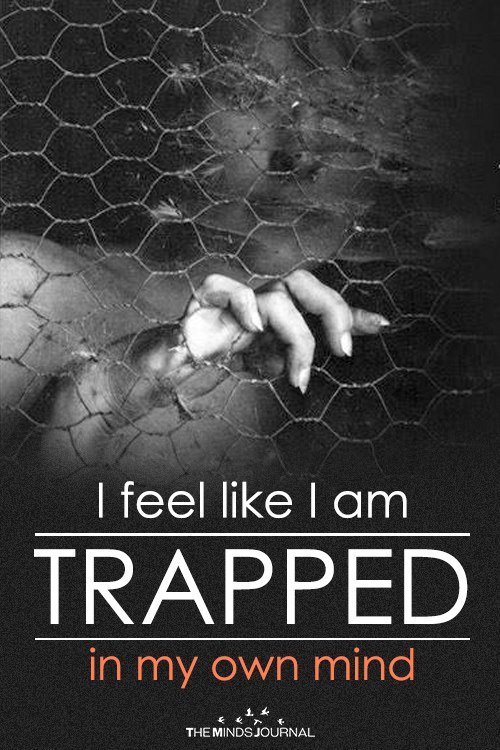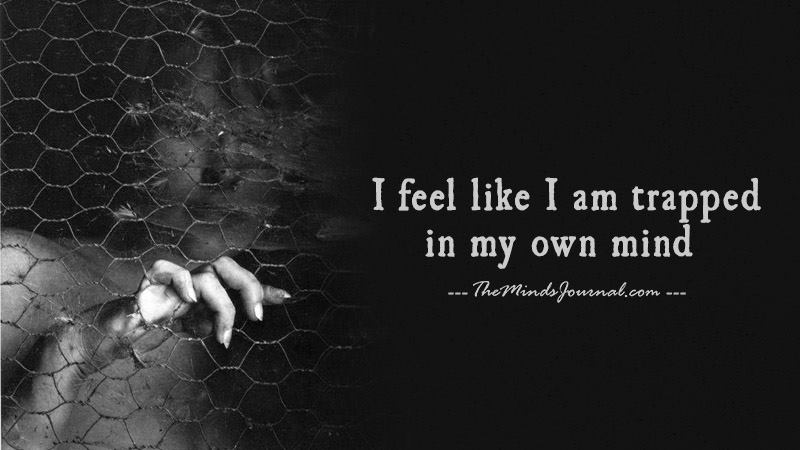Feeling trapped in your own mind is an unpleasant feeling and one many people with anxiety suffer with.
I could give a list of why this is but in my opinion the main cause is the endless thinking about ‘us’. If you think about the average person walking down the street, they will be thinking about the meal on Saturday, then the meeting at work later in the day, meeting friends for lunch, everything is outward, where as anxiety sufferers think mainly of themselves and how they are feeling, everything is inward, which causes many of the feelings of being trapped in your own mind.
I spent years thinking about me, worrying and trying to figure a way out of the way I felt, but this had the opposite effect and I began to feel more and more trapped and isolated. Of course I would feel trapped in my own mind, it makes sense to me now as I never let anything else in, the deep thinking about the way I felt and how to escape had sent me down a path where ‘anxiety’ had become me, I was so used to worrying and thinking that this became a habit, like a needle stuck in a record.
So what I needed to do was change this process and let other things into my day, live in the present and stop worrying about me, the past and the future, it was time to escape from my own mind, to unlock some doors and begin to live again. So I had to begin teach myself to live in the present. If I had to cook, then I would cook, I would not cook and worry about me anymore. If I went to the shop to buy some groceries then that is what I would do, I would not spend the whole walk thinking about how to escape from my anxiety. Of course the habit to think about me was there, I felt as though my mind was on me most of the day, but that was fine, that was a habit, this would thaw in time as long as I continued to practice this way.
Anyone who knows me will know I am not a big fan of forums, I really dislike them because again I think people become reliant on them, logging in everyday to talk and read about anxiety, day in day out and to be fair I see the same names there years later. I am anxiety free now but I am involved so much in the subject I do need to take a break from time to time, I need to have other things in my life and I make a conscious effort to play sport, to socialize, to go out riding my bike and other things. My week has many a focus and feels fresh and not bogged down with one subject.
So anxiety or not just try and add other things into your week, try not to worry so much, anxiety has a habit of making us think the worst and on finding an outlet things get magnified. Trust me once you take the anxiety away then you find it hard to worry, the need is just not there. This taught me a lot once I began to really make strides into my recovery. Before I would be in worry mode and think everything needed to be sorted out, worry about what people thought, worry about meeting someone, worry about how I was feeling, the whole cycle. But into my recovery I would have some really good weeks, almost anxiety free and the need to worry would not be there, I would smile at some of things that had me worrying the month before. The trick then was to realize that my anxiety magnified things and the next time anxiety reared its head I would just let everything go, it was not going to have me worrying, going over things trying to make things right, my anxiety was no longer going to send me down the road of worry, making me feel awful, the worries were false anyway, caused by my anxiety needing an outlet. In time I actually became a master in letting things go, the more you practice the easier things get.
Feeling free of my own mind was a gradual process, it came in layers, the worry slowed, my mind became clearer and I felt alive again, free of myself. Below is a list of things that helped me overcome this feeling and what caused me to feel this way in the first place.
Read How Optimistic Women Stay Trapped In Unhealthy Relationships
What Caused It:
The deep thinking about my condition
Worrying about everything and anything
Not adding other things into my day, having no other focus but me
Things That Helped Me:
Getting out and socializing more, finding new hobbies, in my case it was rediscovering my love for sport. In the early days I had to drag the old worrying me there, but I went for a swim, went cycling and just stopped sitting at home brooding about my situation. I trusted that in time my mind would regain its flexibility, would welcome plenty of other things to focus on, become more flexible and in time it did. I would wake up and think about it being a nice day and about my bike ride, I would stop off for a drink and a sandwich, before I would wake up and think ‘Anxiety and how am I going to get rid of it’ to feel more real I had live more real was my motto.
Just living for that day. The first time I went running I was thinking how great I would feel, how my anxiety would improve and almost watching how I felt when I got back and being disappointed if I did not. Again I was doing things wrong, I was running to fix my anxiety and again doing two things at once, running and thinking about me, instead of just being in the present and running. So the next time I went I thought I don’t care how I feel when I get back, if I feel great then brilliant, if not then o.k, that is not why I am running anymore and the run was far better. I would lose myself in what was around me, the fields, the birds, the run itself and I enjoyed the run so much better. Before if I was doing a task and the curtain of dread and anxiety fell, I would go on autopilot with the task I was doing and concentrate on me again and why I felt so bad and try and fix it, but I knew in time this was wrong and the next time the cloud of anxiety fell, I let it and just carried on with the task in hand there was nothing to fix. And again in time I stopped worrying about me so much and I became more involved in what was around me, I was bothering less and less about me. This took time but the rewards were great.
You will find many people who have recovered from anxiety no longer come on this blog, there are many like this as they now just want to go out and live again, they don’t feel the need to drown themselves in the subject. I tell a lot of people who visit here that the blog is a great place to educate yourself and not feel so alone, but take some time out from it, go out and do things, have another focus and maybe just come back for a read from time to time.
Anyway I hope people got something out of the above. Just to let everyone know I will be doing the 10k run for the charity Anxiety care two weeks on Sunday with Mike from this blog. I am just about up to full fitness and am really looking forward to it. Just to say thank you to everyone who has sponsored me, you all know who you are. I can’t tell you how thankful I am and I promise to post all the pics of the day up on here afterwards.
Read Emotional Muscle Memory: How To Release Painful Emotions Trapped In Your Body
Written by Paul David

Become a Contributor at The Minds Journal
We Want To Hear Your Story. Share your work,thoughts and writings and we will make sure, it reaches the world! Submit Now








Leave a Reply
You must be logged in to post a comment.